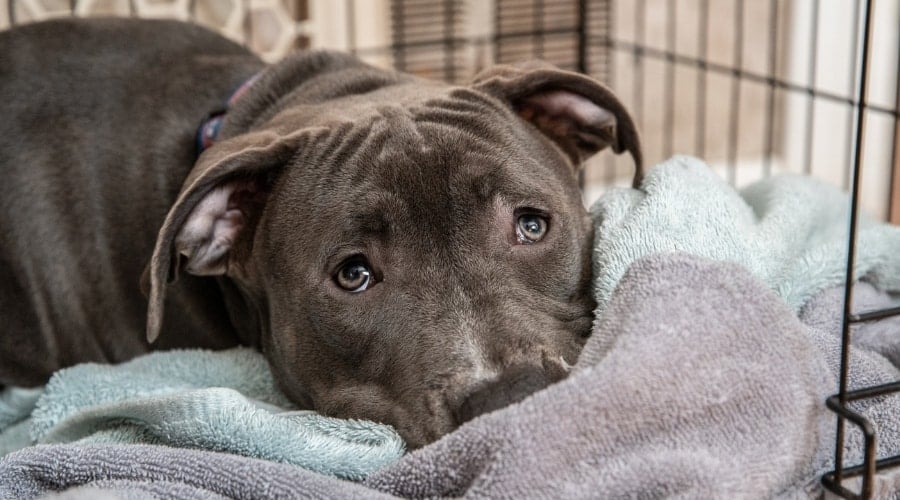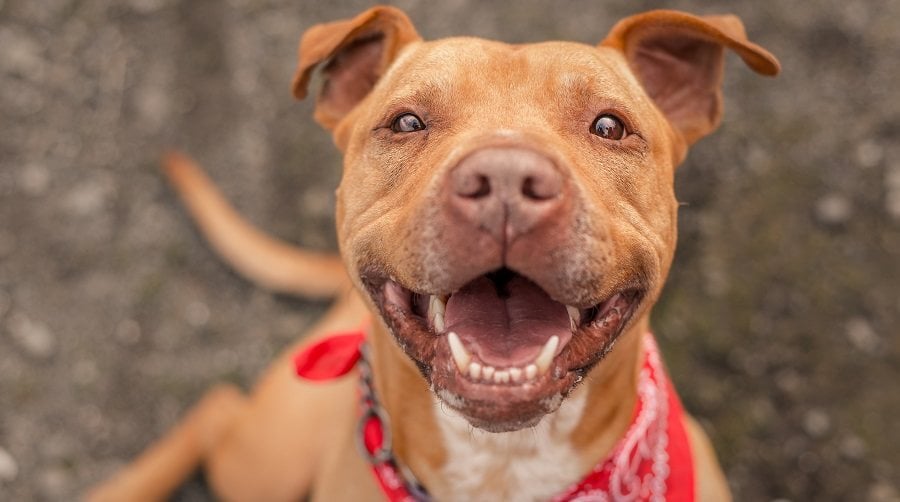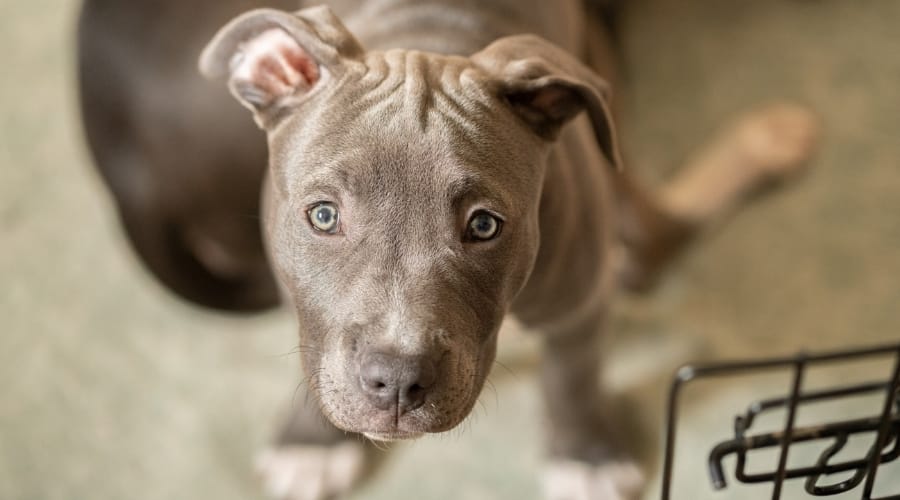Best Pet Insurance For Pitbulls
When you purchase through links on our site, we may earn a commission. Here’s how it works.

We love Pitbulls, but did you know that the “Pitbull” isn’t technically a breed? Several dog breeds are regularly mistaken for Pitbulls, but there are only four types of Pitbulls (American Pitbull Terrier, American Staffordshire Terrier, Staffordshire Bull Terrier, and American Bully). Surprisingly, these dogs are considered more healthy than many other purebred dogs.
Table of Contents
However, no dog is immune to potential health issues. That’s why it’s good to know the possible health threats associated with these breeds and how you can protect your Pittie and your budget to ensure your pup gets the vet care they need.
I’ll share the most common potential Pittie health problems and associated costs. I’ve specialized in pet insurance for over a decade, so I can also help you find the best pet insurance for your Pitbull. It’s important to note that not all pet insurance policies are the same and each dog has their own unique needs. So I’ll recommend the ideal insurer given your pup’s needs.
Best Pet Insurance For Pitbulls
I conducted extensive research into all the top pet insurance companies to narrow down the best policies for Pitbulls based on their needs. I selected these insurers based on many factors, including the dog’s age, coverage, specific health conditions, premium pricing, and more.
| Best For | Company | Get Quotes | Read In-Depth Reviews |
|---|---|---|---|
| Value |  | Read Review | |
| Pitbull Puppies |  | Read Review | |
| Unique Benefits |  | Read Review | |
| Unlimited Payouts | Read Review | ||
| Customizable Plans |  | Read Review | |
| Most Affordable |  | Read Review | |
| Vet Direct Pay |  | Read Review |
Best Value: Pets Best

- Policy Options: Accident-Only, Accident & Illness, Wellness
- Annual Deductible Options: $50, $100, $200, $250, $500, $1,000
- Annual Payout Options: $5,000, $10,000, Unlimited
- Reimbursement Options: 70%, 80%, 90%
Why I Picked Pets Best
Pets Best offers some of the best pricing for vast coverage for Pitbulls across all ages and locations. It also gives you some fantastic customizable options — this adaptability allows you to create a plan that best suits your Pittie’s needs and budget. It’s even one of the few insurers to offer an accident-only plan, a convenient alternative if your budget is tight. You can also add a wellness plan at an affordable monthly cost, making it easier to plan for routine vet care costs like annual exams and dental cleanings.
Pets Best is also of tremendous value because it covers curable pre-existing conditions, such as broken bones and skin infections, once healed or cured. This unique benefit is not commonly offered by all pet insurance providers. Furthermore, Pets Best has no upper age limits, so you can enroll an older Pitbull; however, it’s best to enroll your Pit earlier in life due to their hereditary conditions.
Expert Price Analysis
When I ran quotes for various Pitbull ages and locations, Pets Best premiums fell below average compared to other insurers for the same payout, deductible, and reimbursement rates. I also compared its pricing with exam fees added on, and Pets Best came out to be a fantastic value for its premium prices and coverage.
| Pros | Cons |
|---|---|
| One of very few insurers to offer an accident-only policy | Longer than average claim processing time of 18-30 days |
| 5% multi-pet discount | |
| Optional wellness plan available | |
| Customizable annual deductible, reimbursement, and annual payout options | |
| Can upgrade accident and illness plans to include exam fees and complementary therapies* | |
| No upper age limits | |
| Waiting period for hip dysplasia coverage is only 14 days (great for prone Pitbulls) |
In-Depth Review Of Pets Best
See my full review of Pets Best for more details about this insurer’s plan offerings, coverage, reimbursement process, and more.
Best For Pitbull Puppies: Embrace

- Policy Options: Accident-Only, Accident & Illness, Wellness
- Annual Deductible Options: $100, $250, $500, $750, $1,000
- Annual Payout Options: $2,000, $5,000, $8,000, $10,000, $15,000, Unlimited
- Reimbursement Options: 70%, 80%, 90%
Why I Picked Embrace
Embrace is a standout choice for Pitbull puppies. Offering some of the most extensive coverage and fewer exclusions at pocket-friendly prices, this insurer is exceptional when protecting your little Pittie’s health for years to come. And the best part? You can start coverage for your puppy as early as six weeks old, beating the industry standard of eight weeks. Plus, Embrace’s diminishing deductible rewards you with a $50 deductible decrease each year you don’t make a claim.
Embrace makes the insurance process for Pitbull puppies a breeze. Their accident and illness plans include coverage for behavioral therapy, and complementary therapy, all without the need for additional add-ons. Moreover, Embrace prides itself on fast claim reimbursement, with an average turnaround time of five days. If you’re a pup parent looking for hassle-free, comprehensive coverage for your Pittie, Embrace is the insurer for you.
Expert Price Analysis
When I ran multiple quotes for varying Pitbull ages and locations, Embrace’s premium pricing for puppies and older dogs fell on the lower end to mid-range. It’s important to note that Embrace offered no coverage for a 5-year-old American Pitbull Terrier residing in Sacramento, CA.
| Pros | Cons |
|---|---|
| Among the lowest quoted pricing for Pitbull puppies | Only offers accident-only coverage for dogs enrolled after their 15th birthday |
| 10% multi-pet discount (the best in the industry) | Some Pitties are uninsurable, depending on age and location |
| Your deductible decreases by $50 each year you don’t receive a claim payment | Wellness plans aren’t the best value compared to other insurers |
| Policies include $1,000 for dental illness coverage annually | 6-month waiting period for hip dysplasia coverage |
| Exam fees and prescription drugs for covered conditions are add-ons |
In-Depth Review Of Embrace
My comprehensive review of Embrace provides more details on this insurer’s policy options, coverage, reimbursement process, FAQs, and more.
Best For Unique Benefits: Fetch

- Policy Options: Accident & Illness, Wellness
- Annual Deductible Options: $300, $500, $700
- Annual Payout Options: $5,000, $10,000, $15,000
- Reimbursement Options: 70%, 80%, 90%
Why I Picked Fetch
Fetch pet insurance not only provides comprehensive coverage for your pet’s needs, but it also offers unique benefits. These include coverage for virtual vet appointments with no copay or deductible, coverage for your pet’s boarding fees if you become hospitalized, and coverage for vacation cancellation if your pet falls ill. In the unfortunate event that your pet gets lost, Fetch will cover advertisement and reward fees and provide up to $1,000 if you don’t reunite with your furry friend, ensuring that your investment in your pet’s health and well-being is protected.
Fetch’s policies are designed for your convenience, providing coverage for sick vet exam fees, behavioral therapies, and complementary therapies. Other significant features include coverage for treatable pre-existing conditions after one year and pre-approval of cost estimates and procedures before treatment.
Expert Price Analysis
A general trend in Fetch’s pricing can be hard to nail down for many breeds, including Pitbulls. With the quotes I ran, Fetch was sometimes below average for puppies and younger Pitties but more often fell in the mid-range in premium pricing. For older Pitties, prices tended to fall on the higher end. These quotes used the same deductible, reimbursement, and payout rates for comparison to other pet insurance providers.
| Pros | Cons |
|---|---|
| All policies cover sick visit exam fees, behavioral therapies, complementary therapies, and C-sections | Accident waiting period is longer than average (15 days) |
| Covers curable pre-existing conditions after 1 year | 6-month waiting period for hip dysplasia coverage |
| 3 different wellness plan add-ons are available | |
| Can enroll puppies as young as 6 weeks old |
In-Depth Review Of Fetch
Check out my extensive review of Fetch to learn more about this insurer’s accident and illness coverage, wellness plan options, other unique benefits, and more.
Best For Unlimited Payouts: Healthy Paws

- Policy Options: Accident & Illness
- Annual Deductible Options: $100, $250, $500, $750, $1,000
- Annual Payout Options: Unlimited
- Reimbursement Options: 50%, 60%, 70%, 80%, 90%
Why I Picked Healthy Paws
Healthy Paws’ policies not only offer unlimited payouts, but their premium pricing can also be surprisingly competitive. They are often more affordable than other insurers with the same deductible, reimbursement, and unlimited payouts. Moreover, Healthy Paws is known for its outstanding reputation for superior customer service and much lower-than-average claim processing time, providing you with the peace of mind you need when your Pittie is hurt or ill.
Healthy Paws is a great option if you want to avoid exceeding an annual cap and prefer getting reimbursed quickly after paying your vet bill. However, it’s important to note that this insurer has significant exclusions for hip dysplasia coverage, a condition that Pitbulls are prone to developing. The waiting period for hip dysplasia is 12 months. If you enroll your Pittie after 6 years old, they aren’t eligible for hip dysplasia coverage.
Expert Price Analysis
Because Healthy Paws only offers unlimited annual payouts for all plans, it’s hard to compare premium costs for the same coverage with other insurers. However, in some of the quotes I ran, Healthy Paws’ premiums were only a few dollars more than a $5,000 annual payout and a similar reimbursement and deductible. Still, Healthy Paws is exclusive for some pets. For example, a 5-year-old Pittie residing in Buffalo, NY, was uninsurable through Healthy Paws. Also, several other Pitbull pet insurance quotes had no customizations available (mostly limited to a $500 deductible and 70% reimbursement).
| Pros | Cons |
|---|---|
| All plans offer unlimited payouts | Customization options can be very limited for older dogs |
| Low pricing compared to many competitors for plans with unlimited payouts and comparable coverage | No option for vet exam-fee coverage |
| Claim processing time is far below average at 2 days | Pets enrolled after 6 years old aren’t eligible for hip dysplasia coverage |
| High customer satisfaction |
In-Depth Review Of Healthy Paws
I encourage you to read my extensive review of Healthy Paws if you want to learn more about what this provider covers, its limitations, its reimbursement process, and more.
Best Customizable Plans: Figo

- Policy Options: Accident & Illness, Wellness
- Annual Deductible Options: $100, $250, $500, $750
- Annual Payout Options: $5,000, $10,000, Unlimited
- Reimbursement Options: 70%, 80%, 90%, 100%
Why I Picked Figo
Figo provides multiple options to tailor a policy that best suits your Pittie’s healthcare needs and your budget. It offers three accident and illness plans, including a Value Plus plan, or you can create a custom plan by choosing from various annual deductible, reimbursement, and annual payout options. Additionally, Figo offers unlimited annual payouts and 100% reimbursement, which is rare in the insurance industry.
All plans cover gum disease, behavioral therapy, complementary therapy, and curable pre-existing conditions if there have been no signs or symptoms within the last year. Figo also delivers responsive and helpful customer service and fast claim processing, making it an excellent choice for Pitbull owners.
Expert Price Analysis
When I ran quotes for various Pitbulls for less coverage ($750 deductible, 70% reimbursement, and $5,000 payouts), Figo fell in the lower to mid-range for premium pricing. On the flip side, when I maxed out coverage ($100 deductible, 90% reimbursement, and unlimited annual payouts), Figo was higher than many other insurers.
| Pros | Cons |
|---|---|
| 3 plans available, or customize your own with many options | Exam fee coverage requires an add-on |
| 5% multi-pet discount | 6-month waiting period for hip dysplasia coverage |
| Accident waiting period is only 1 day | |
| 2 wellness plans are available | |
| Your deductible decreases by $50 each year you don’t receive a claim payment | |
| Short claims processing time, averaging 3 days |
In-Depth Review Of Figo
Check out my extensive review of Figo to learn more about this provider’s plan offerings, coverage, exclusions, reimbursement process, and my personal experience with Figo.
Most Affordable: Lemonade

- Policy Options: Accident & Illness, Wellness
- Annual Deductible Options: $100, $250, $500, $750
- Annual Payout Options: $5,000, $10,000, $20,000, $50,000, $100,000
- Reimbursement Options: 60%, 70%, 80%, 90%
Lemonade Pet Insurance Is NOT Available In: AK, DE, HI, ID, KS, KY, ME, SD, VT, WV, WY
Why I Picked Lemonade
If you’re looking for a pet insurance option that won’t break the bank, Lemonade could be your best bet. Their accident and illness plan, with its varying deductibles, payouts, and reimbursement rates, often comes out more affordable than its competitors for Pitbulls. Just keep in mind that if you need coverage for exam fees, physical therapy, behavioral therapy, or extensive dental care, your monthly premium might be slightly higher.
It’s worth noting that Lemonade began offering pet insurance in 2020 and is less established than the other insurers mentioned in this article. Despite being a newer player in the pet insurance industry, Lemonade has already gained an excellent reputation for its efficient service. They process claims swiftly, providing peace of mind regarding your pet’s health and finances. Plus, they offer a 10% discount when you bundle your pet insurance with your Lemonade renters, homeowners, or auto insurance.
Expert Price Analysis
When I ran quotes for different Pitbull ages and locations, Lemonade consistently had some of the lowest pet insurance premiums when using the same deductible, annual payout, and reimbursement. Even with the addition of exam fee coverage, Lemonade still fell below average for premium pricing. And with all of its add-ons and maximum coverage, it’s competitively priced.
| Pros | Cons |
|---|---|
| Often, the most affordable pricing for Pitbulls | Not available in 12 states |
| Many customization options to fit your budget | Must purchase add-ons for exam fees, higher dental coverage, complementary care, and behavioral therapy |
| 5% multi-pet discount | No coverage for alternative therapies |
| Claim processing averages only 2 days (and often occurs within minutes) | |
| Optional wellness plans available | |
| Waiting period for hip dysplasia coverage is only 30 days |
In-Depth Review Of Lemonade
Be sure to read my comprehensive review of Lemonade for more details on this provider’s many customization options, coverage, reimbursement process, FAQs, and more.
Best For Vet Direct Pay: Trupanion

- Policy Options: Accident & Illness
- Lifetime Per-Condition Deductible Options: $0 – $1,000 (in $5 increments)
- Annual Payout Options: Unlimited
- Reimbursement Options: 50%, 60%, 70%, 80%, 90%, 100%
Why I Picked Trupanion
The only pet insurance company that can directly pay its portion of your veterinarian bill at the time of checkout is Trupanion. You don’t have to worry about reimbursement later because their VetDirect Pay system is simple to integrate into your veterinarian’s office. Your veterinarian can contact Trupanion for installation if they still need to set up the software so that you can benefit from this feature. Because Pitbulls frequently have expensive medical conditions, VetDirect Pay can significantly reduce your concerns about paying for veterinary care during diagnosis and treatment.
Expert Price Analysis
The quotes I ran from Trupanion had the highest premiums for Pitbulls by far. In many cases, Trupanion’s premiums were several hundred dollars more for the same dog. Although Trupanion offers unlimited payouts with all plans, its pricing is still higher than that of other insurers with unlimited payouts.
| Pros | Cons |
|---|---|
| Unlimited payouts with all plans and 90% reimbursement with most plans | Does not offer coverage for exam fees |
| Trupanion can pay your vet directly to avoid waiting for reimbursement | Consistently more expensive for Pitties than other insurers |
| $0 deductible and 100% reimbursement available in some states | |
| Waiting period for hip dysplasia coverage is only 30 days |
In-Depth Review Of Trupanion
Check out my comprehensive review of Trupanion for more details on this provider’s coverage, reimbursement process, waiting periods, and more.
What Type Of Pet Insurance Plan Is Best For Pitbulls?

Providers offer two types of pet insurance plans: accident-only and accident and illness. Some insurers also offer wellness plans as an optional add-on to your policy. However, it’s important to know that wellness plans are not insurance products. Still, they’re often offered during enrollment, so I’ve included them below to give you a better idea of options for your Pittie.
| Accident-Only | Accident & Illness | Wellness | |
|---|---|---|---|
| Injuries (CCL tears, canine bloat, foreign object ingestion, broken bones, etc.) | |||
| Diseases (hip dysplasia, heart problems, cataracts, allergies, cancer, hypothyroidism, etc.) | |||
| Preventative (annual exams, vaccinations, dental cleaning, etc.) |
What Are Accident-Only Pet Insurance Plans?
An accident-only plan covers the cost of emergencies due to injuries and accidents. Some common examples include canine bloat, cranial cruciate ligament tears (CCL), foreign body ingestion, broken bones, wounds, eye trauma, and more. These plans don’t cover any hereditary diseases or illnesses. An accident-only plan can be a good option for a pet with many pre-existing conditions that wouldn’t be covered. However, not many pet insurance providers offer accident-only plans.
Pricing Tip – Accident-only plans are typically more affordable than accident and illness plans because they only cover accidents.
What Are Accident & Illness Pet Insurance Plans?
Accident and illness plans are a better option if you want the most comprehensive coverage for your pup. In addition to covering accidents and injuries, accident and illness plans give you coverage for hereditary conditions and illnesses that most commonly affect Pitties, such as hip dysplasia, cancer, heart disease, cataracts, parvovirus, hypothyroidism, skin infections, allergies, and more.
What Are Wellness Plans?
Wellness plans, available as an optional add-on to a pet insurance policy or a standalone product, cover a portion of the costs for routine preventative care. They typically cover routine vaccinations, annual checkups, parasite prevention, professional dental cleanings, and more. A wellness plan can be a great way to help you budget for the necessary preventative care to keep your Pitbull as healthy as possible.
Wellness plans are not pet insurance and don’t cover any costs related to illnesses or accidents.
What Does Pet Insurance Cover & Exclude?
Covered and excluded items depend on the company and the type of policy you purchase. However, most providers’ accident and illness pet insurance plans cover the following items when deemed medically necessary. Still, it’s crucial to read through any policy carefully before signing up because specific item coverage can have limitations.
| Covered | Excluded |
|---|---|
| Blood tests | Boarding |
| Cancer (chemo & radiation) | Cremation & burial costs |
| CT scans | Elective procedures (e.g., declawing, ear cropping, spaying/neutering, tail docking, etc.) |
| Chronic conditions | Food & supplements |
| Congenital conditions | Grooming |
| Emergency care | Pre-existing conditions* |
| Euthanasia | Pregnancy & breeding |
| Hereditary conditions | Vaccines |
| MRIs | |
| Non-routine dental treatment | |
| Prescription medications | |
| Rehabilitation | |
| Specialized exams & care | |
| Surgery & hospitalization | |
| Ultrasounds | |
| X-rays |
Learn More About Pet Insurance Coverage
Read my comprehensive guide on what pet insurance covers to learn much more about coverage and exclusions.
What Determines The Cost Of Pet Insurance For Pitbulls?

Pet insurance pricing for Pitbulls can be complex. For example, it depends on what type of Pitbull breed you have. I’m focusing on the American Pit Bull Terrier in this review, but insurance pricing could be different for American Staffordshire Terriers, Staffordshire Bull Terriers, American Bullies, and Pitbull mixes.
Also, every pet insurance policy’s premium is based on many factors, including your Pittie’s age, location, each company’s underwriting criteria, and more. However, some general factors affect premium pricing, including these below.
- Your pup’s age plays a significant role in pet insurance pricing. For example, young Pitbulls are typically at a lower risk of experiencing illnesses, so premiums are lower. In contrast, insuring older Pitties is more expensive because they’re more likely to face health problems.
- The cost of living in your area is also a significant factor in the pricing of pet insurance premiums. Veterinarians in your area are subject to the same cost fluctuations in office rentals, staff salaries, equipment, and more as you are for home pricing, groceries, and other expenses. Therefore, if the cost of living is high in your area, then chances are your pet insurance premium and vet bills will be higher, too.
- Female dogs can be less expensive to insure compared to male dogs. Why? With many breeds, including Pitbulls, males are typically larger, so they require higher doses of medication and additional medical supplies than females. However, not every insurance provider has a significant disparity between males and females.
Several other factors can influence premium pricing besides your pup’s age, gender, and where you live. That’s where the ability to customize your policy can be a huge help in fitting the policy’s pricing into your budget. Some insurers give you more customization options than others, but most allow you to adjust your deductible and reimbursement rates to find a premium that suits your needs. I’ll explain how this all works below.
Customization Options Affect Cost & Benefits
When it comes to pet insurance, knowledge is power. Most providers offer a variety of customizable options, allowing you to tailor your policy to your pup’s unique needs and your budget. You’ll first decide whether to opt for an accident-only or accident-and-illness policy. From there, you can adjust your maximum payout, deductible, and reimbursement percentage. However, it’s crucial to understand how these choices impact your benefits. I’ll guide you through this process below, ensuring you feel confident and informed in your decisions.
What Is The Maximum Payout & Why Does It Matter?
Most pet insurance companies offer annual payouts, while a few provide lifetime payouts. What’s the difference? A lifetime payout is the highest amount the provider will reimburse you over the entire time your pet is insured. An annual payout, on the other hand, is the maximum amount the insurance provider will reimburse during your policy’s annual period. The most common annual payout options are $5,000, $10,000, and unlimited.
Pricing Tip – I encourage you to consider your maximum annual limit carefully. Choosing a lower payout lowers your premium, but this means you’ll be responsible for more out-of-pocket expenses if your Pitbull requires expensive vet treatment.
Is The Deductible Annual Or Per-Condition?
Your deductible is the set amount you’re responsible for paying before the provider covers the remainder of your vet costs. Understanding the difference between annual and per-condition deductibles is crucial for your financial planning. These can vary by provider, but most insurers have annual deductibles. The most common options are $100, $250, and $500.
One key benefit of an annual deductible is that it requires you to pay the amount you choose for your policy once per year, regardless of how many treatments your pet needs that year. This makes budgeting your pet’s health care costs easier, a significant advantage for pet owners.
On the other hand, per-condition deductibles require you to pay the deductible amount for each new emergency or condition your pet encounters. Per-condition deductibles can get expensive if your Pittie has multiple different health issues that occur in one year. However, if your Pitbull is diagnosed with a chronic condition, like skin allergies, you’re only responsible for paying the deductible once for that condition over your pup’s entire insured lifetime.
Pricing Tip: Choosing a lower deductible will increase your monthly premium, but you’ll end up paying less out-of-pocket at the time of treatment.
What’s The Reimbursement Percentage?
One of the key aspects you can customize in your pet insurance plan is the reimbursement rate. This rate represents the percentage of your total vet expenses that the insurance provider will cover after you’ve paid your deductible. To put it simply, you’re responsible for the remaining amount, known as the copay, after the insurer has paid your chosen reimbursement percentage. For instance, if you opt for an 80% reimbursement rate, you’ll be paying 20% of the total veterinary care costs once you’ve met your deductible. The reimbursement percentage options vary among providers, but the most common ones are 70%, 80%, and 90%.
Pricing Tip – A higher reimbursement percentage increases your monthly premium but results in lower out-of-pocket expenses for treatment.
Learn More About Pet Insurance Costs
My comprehensive guide on pet insurance costs gives you more details on how all of these factors can affect your premium and benefits.
How Much Is Pet Insurance For A Pitbull?
Because a “Pitbull” isn’t one specific breed, it’s difficult to get a totally accurate idea of pet insurance costs. That’s why I encourage you to run quotes for yourself. Many pet insurance companies give you the option of getting quotes for the most common Pitbull breeds (American Pitbull Terrier, American Staffordshire Terrier, Staffordshire Bull Terrier, and American Bully, as well as Pitbull mixes). All you have to do is enter your zip code and your dog’s information in the quote form below, and we’ll provide you with personalized insurance quotes from many providers.
According to NAPHIA (North American Pet Health Insurance Association), the average monthly premium for an accident and illness dog insurance policy in the U.S. is $62.44 ($32.10 for cats).
To give you a general idea of Pitbull insurance policy costs, I ran multiple quotes for the most widely recognized breed of Pitbulls in the U.S., the American Pitbull Terrier. The following are monthly premium costs for American Pitbull Terriers of varying ages and locations.
| Company | 6mo old male 95818 (Sacramento, CA) | 1yr old female 14211 (Buffalo, NY) | 2yr old male 33604 (Tampa, FL) | 5yr old female 79404 (Lubbock, TX) | 8yr old male 07108 (Newark, NJ) |
|---|---|---|---|---|---|
 | $51.51 | $33.88 | $30.84 | $40.09 | $91.66 |
 | $51.51 | $55.07 | $67.37 | $62.98 | $167.28 |
| $59.13*§ | $44.76*§ | $38.76*§ | $61.90*§ | $97.96†§ | |
 | $46.60 | $55.20 | $37.57 | $44.87 | $92.48 |
 | $71.03 | $65.84 | $52.60 | $68.48 | $172.18 |
 | $39.45 | $36.65 | $27.64 | $25.17 | $72.09 |
 | $91.35§ | $102.79§ | $349.40‡§ | $184.17§ | $362.48§ |
*70% reimbursement; †50% reimbursement and $1,000 deductible (no other options); ‡$0 deductible; §Unlimited annual payouts
Pitbull Insurance Cost: Lowest & Highest Amounts
I also gathered the lowest and highest monthly costs for American Pitbull Terrier pet insurance from these same top companies, factoring in annual payout, deductible, reimbursement, and add-on options (excluding wellness plans). I included two different ages to demonstrate how premiums vary based on a dog’s enrollment age.
| Company | 2mo old 95818 (Sacramento, CA) | 5yr old 95818 (Sacramento, CA) | 2mo old 14211 (Buffalo, NY) | 5yr old 14211 (Buffalo, NY) | 2mo old 33604 (Tampa, FL) | 5yr old 33604 (Tampa, FL) | 2mo old 79404 (Lubbock, TX) | 5yr old 79404 (Lubbock, TX) | 2mo old 07108 (Newark, NJ) | 5yr old 07108 (Newark, NJ) |
|---|---|---|---|---|---|---|---|---|---|---|
 | $23-$143 | $31-$193 | $15-$96 | $20-$130 | $16-$102 | $20-$126 | $15-$82 | $18-$102 | $16-$100 | $21-$135 |
 | $37-$94 | $77-$202 | $38-$84 | $69-$157 | $44-$100 | $80-$185 | $25-$54 | $44-$97 | $38-$83 | $67-$152 |
| $39-$78 | $57-$86 | $38-$61 | Uninsurable | $28-$67 | $45-$118 | $36-$57 | $52-$63 | $40-$63 | $59-$70 | |
 | $23-$181 | Uninsurable | $27-$169 | $28-$173 | $21-$97 | $27-$126 | $19-$91 | $25-$119 | $28-$129 | $36-$169 |
 | $31-$185 | $41-$240 | $27-$206 | $35-$267 | $22-$163 | $31-$237 | $19-$142 | $27-$206 | $32-$206 | $41-$267 |
 | $21-$151 | $29-$196 | $25-$134 | $28-$152 | $18-$124 | $24-$167 | $19-$93 | $19-$96 | $22-$113 | $26-$131 |
 | $55-$228 | $94-$410 | $54-$227 | $92-$406 | $145-$268 | $309-$572 | $56-$234 | $110-$485 | $70-$297 | $141-$631 |
How Does Pet Insurance For Pitbulls Work?

Pet insurance helps cover the cost of vet treatment for your insured Pittie’s condition. But keep in mind that before your coverage begins, you’ll first need the waiting periods to be over. The good news is that using pet insurance is extremely simple.
- Take your Pitbull to the vet and pay the bill at the time of service.
- Submit a completed claim form and an itemized receipt to your insurance company. Some companies require a signature from your vet, so it’s a good idea to take a printed copy of your claim form to your visit.
- Once the claim is approved, the insurance provider will send your reimbursement* via your chosen payment method (check, direct deposit, etc.).
*The reimbursement timeline can vary from a few minutes to a few weeks, depending on the complexity of your claim and the promised processing time.
What Are Waiting Periods For Pitbull Pet Insurance?
Waiting periods are the time between enrolling in a pet insurance policy and starting coverage. Each pet insurance provider has different waiting periods, but most have them for accidents (usually ranging from 0 to 15 days) and illnesses (usually 14 days). Additionally, some companies require waiting periods (up to one year) for orthopedic conditions like hip dysplasia, which Pitbulls are prone to.
*States are gradually adopting a Model Law for pet insurance, aiming to standardize regulations, including uniform waiting periods. In California, Delaware, Louisiana, Maine, Mississippi, Nebraska, New Hampshire, Washington, Rhode Island, and Maryland, waiting periods are:
- Accidents: 0 days
- Illnesses: 14 days
- Cruciate Ligament Conditions: 30 days
- Routine Care: 0 days
Learn More About Waiting Periods
Read my complete guide on pet insurance waiting periods for a deeper understanding of why waiting periods exist and other important information.
Common Health Issues In Pitbulls

Unlike other purebreds, Pits aren’t predisposed to quite as many severe health concerns. However, there’s no certainty in whether your dog will suffer from any issues or not. The health issues below can give you an idea of what to look for regarding symptoms and insurance coverage.
- Hip dysplasia is a chronic condition where the head of the femur bone doesn’t fit correctly into the hip socket. This is one of the most commonly occurring orthopedic conditions in dogs. Surgery is often needed to improve the quality of your dog’s life. And this procedure ranges from $1,700 to $4,500+, depending on the type of surgery required.
- Pitties are at a higher risk of suffering cranial cruciate ligament (CCL) tears due to their medium to large size and high energy levels. A CCL is similar to a human’s anterior cruciate ligament (ACL). Orthopedic surgery is the best option to fix a torn CCL in dogs, and costs can range from $1,600 to $6,000 or more.
- Pitbulls can struggle with numerous skin issues, including allergies, itchy or flaky skin, rashes, red bumps, and more. According to Healthy Paws Insurance, skin issues are among the most common dog health issues. Diagnosis and treatment for chronic allergies and skin problems, including skin infections and eczema, can easily add up to more than $4,000 during a pup’s lifetime.
- A life-threatening illness, canine bloat occurs when dogs eat too much or too fast, causing the stomach to expand and twist. Immediate treatment is necessary, or death could occur within hours. The treatment cost can be as high as $3,000 or more.
- Canine parvovirus is an extremely contagious intestinal illness that Pitties are more susceptible to than many other breeds. It primarily affects puppies between the ages of six weeks and six months, and fortunately, there’s a vaccine to prevent it. However, if your puppy contracts parvo before they’re fully protected, treatment costs range from $1,000 and $2,100, depending on the severity.
- Cataracts and juvenile cataracts are more common in Pitbulls. A cataract is a cloudy area that forms in the lens of the eye. This clouding prevents light from passing normally through the lens to the back of the eye. As a result, the cataract can cause blurry vision (and pain if left untreated over time). The cost of cataract surgery for dogs averages $2,700-4,000.
- In addition to cataracts, Pitties are prone to other eye problems, including progressive retinal atrophy (PRA), distichiasis, cherry eye, and hyperplastic primary vitreous (PHPV). Unfortunately, PRA is incurable, but others are curable with surgery. The surgical costs for these conditions can be up to $2,000 each.
- Hypothyroidism is a chronic disease that occurs when the thyroid gland doesn’t produce enough hormones. It requires lifelong medication and testing. Diagnostic testing costs $50 to $150, and medication averages $20 to $50 every month. This condition also requires annual re-testing, which costs $50 to $100.
- Mast cell tumors (MCT) are the most common type of skin cancer in dogs. MCT diagnosis and treatment are extremely expensive; surgical removal typically costs $500 to $1,000, and if radiation is recommended, the cost can range from $4,000 to $10,000.
- Some Pitbulls are prone to heart conditions such as heart murmurs, aortic stenosis, and dilated cardiomyopathy (DCM). Depending on the severity of the disease, treatment for heart murmurs averages about $1,000. DCM, in minor cases, can sometimes be managed with daily medication to control the cardiac system. Surgery to resolve DCM can cost between $10,000 and $20,000.
- Blue-nosed Pitbulls can suffer from low melanin levels, which can cause skin conditions, heart disease, eye conditions, reduced immunity, and put them at a higher risk of developing cancer. If you have a blue-nosed Pitty, you may face more vet bills in the future, making it especially important to insure them.
Is Pet Insurance Worth It For Pitbulls?
The short answer is yes. A survey by Liberty Mutual Insurance states that 63% of pet owners couldn’t afford unexpected medical care for their pets. The critical thing to remember is that you need to sign up for insurance before an emergency arises. You cannot count on coverage for your Pitbull’s pre-diagnosed health issues. So, it’s crucial to get your dog covered as soon as possible.
Determine If Your Pitbull Needs Insurance
Learn more about whether pet insurance is worth it for your Pittie so you can make an informed decision.
5 Steps To Find The Best Pet Insurance For Pitbulls

Keep in mind that Pitbulls have a typical life expectancy of 12 to 14 years. Given their long lifespan, it’s vital to find the ideal insurance plan that meets your pup’s current and future potential needs. Here are the most important factors to consider when selecting the best insurance policy for your Pittie.
- Learn about the insurance companies’ reputations. Companies with years of experience are more stable than brand-new insurers.
- Consider the health issues Pitbulls can potentially face and familiarize yourself with the terms associated with coverage for those conditions.
- Decide if you want accident-only or accident and illness coverage.
- Know how claim reimbursement works and each provider’s average processing time.
- Get pet insurance quotes from at least three companies to compare pricing.
Methodology
To determine the best pet insurance for Pitbulls, we analyzed more than 40 pet U.S. insurance companies to provide an unbiased breakdown of how providers compare against one another. Our in-depth research includes:
- Running thousands of price quotes
- Reading hundreds of customer reviews
- Scrutinizing every policy from top to bottom and reading all the fine print
- Scoping out the purchase process
- Speaking with customer service representatives
- Having firsthand experience submitting claims with companies
- Comparing plan customization details
- Examining how long it takes to receive reimbursement
- Factoring in company history and years in the pet insurance marketplace
- Meeting with company representatives to discuss changes related to the industry, their company, and their offerings
- Requiring national experience for companies
Unlike many other review sites, we refuse to let pet insurance companies pay for the top spot in our rankings. Companies must earn their position in our comparisons by performing well in the marketplace. We also point out each company’s pros and cons in light of their competitor’s strengths. In doing so for over a decade, we’ve helped pet parents make more educated decisions among the top pet insurance options. Pet insurance providers read our reviews, regularly check them for accuracy, and value our input to help create positive industry changes and better protect your pets. We only recommend the best of the best because it’s what our readers deserve.
Additional Pet Insurance Resources
- Best Pet Insurance
- Is Pet Insurance Worth It?
- What Does Pet Insurance Cover?
- How Much Does Pet Insurance Cost?
- Best Pet Insurance For Pre-Existing Conditions
Why Trust Canine Journal?
Canine Journal has been covering the topic of pet insurance since 2012, well before other conglomerates discovered the rising popularity of health care for our pets. Many of our authors have personal experience with pet insurance, including Kimberly Alt, who has been Canine Journal’s go-to writer for pet insurance for over a decade, having written about nearly every possible facet related to pet insurance. Kimberly knows the subject so well that she can answer a breadth and depth of pet insurance questions immediately. And on the rare occasion she doesn’t know the answer off the top of her head, she can find it within minutes due to her vast list of resources. Kimberly also has extensive knowledge of dog health conditions, which can help her recommend pet insurance providers to pet owners with specific breeds.
Kimberly collaborated with Sally Jones, a seasoned health sciences professional with decades of experience. Sally specializes in dog health and is adept at producing content on technical topics such as pet insurance. Her wealth of knowledge and insight played a crucial role in this article’s thorough research and composition.
Kimberly also consulted with Michelle Schenker, Canine Journal’s in-house licensed insurance agent, for additional expertise to ensure accuracy and give Canine Journal the authority to write about and assist readers in purchasing policies that are accurately represented.



